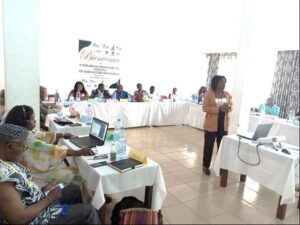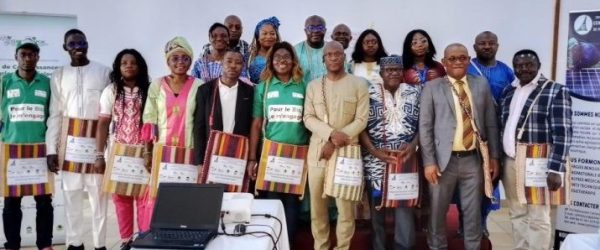The Regional Delegations of Agriculture and Rural Development (DRADER) and the Regional Delegations of Livestock, Fisheries and Animal Industries (DREPIA) of the Centre, East, Littoral, West and North-West were gathered on February 7 and 8, 2023 in the meeting room of the National Episcopal Conference of Cameroon (CENC), within the framework of a training workshop on Organic Agriculture.
This meeting allowed to strengthen the understanding of the authorities on the organic, in order to raise their support at the strategic and technical level for the promotion of this sustainable production system. The five (5) partner organizations implementing the project “Pôle de Connaissances de l’Agriculture Biologique en Afrique Centrale” namely the African Institute for Economic and Social Development (Inades-Formation Cameroun), the International Center for the Promotion of Creation (CIPCRE), the Support Group for Sustainable Development (GADD), the Polyvalent Training Center of Mbouo (CPF), the Support Service for Local Development Initiatives (SAILD) and several officials took part in this training.

This workshop allowed to harmonize the points of view on the content given to the concept ” Bio “. For Jean Claude KONDE, Regional Delegate for Agriculture and Rural Development (DRADER) of the Littoral, ” having knowledge about organic farming is good, getting it down to the field is even better. Continuing his remarks, he added : ” We are ready to go to the field with the partner organizations of this project to promote organic farming to popularize organic”.
Dr. Jonas Temwa, DREPIA West touched on the crux of the problem, ” when will the law on Organic Agriculture ? “, he wondered. As for the Regional Delegate for Livestock, Fisheries and Animal Industries in the West, ” We must intensify the advocacy for this law to come out, because organic production will solve a problem of human health, environment and poverty. We must avoid that it is essentially a commercial concept as it seems to be the case”. The voice of the sunrise region was also heard at this workshop, including Salomon Endom Assengue, DRADER East, who spoke about the benefits of certification as follows We appreciate the entrepreneurial hybrid agriculture that is more intensive and has the organic label thanks to local and alternative certifications. Its production targets the national, regional and international market. It provides the solution to the resilient agriculture we are looking for. Rich and varied discussions complemented these presentations.
Behind organic farming is a complex agriculture, controlled and framed by strict specifications. So many reasons not to improvise a return to the land. Daniel Ngwanou, Director of the CPF of Mbouo urged all participants to engage in organic farming to ensure better health. : ” When the Polyvalent Training Center of Mbouo embarked on the path of promoting organic agriculture in 2012, many people wanted to discourage us. But we held on. If today we all follow this path, we will do wonders to produce food that provides health to Cameroonians,” he said.
In sum, advocacy for the enactment of a national organic law will continue. On the ground, national and international organizations promoting organic farming must continue to develop their initiatives while counting on the collaboration of the Cameroonian Delegations of Agriculture and Livestock.
Marguerite MOMHA, Communication Inades-Formation Cameroon









